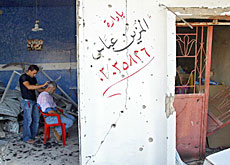
Bern outlines aid programme for Lebanon

Switzerland says it wants to allocate $11.5 million (SFr14.43 million) as soon as possible to support the victims of the latest armed conflict in Lebanon.
It launched an aid programme on Friday called “Back to the villages” which is the focal point of Swiss relief operations in the country.
The head of the Swiss Humanitarian Aid Unit, Toni Frisch, said the project would enable people in the south of the country to return to their villages, some of which had been destroyed and had received little or no assistance.
Frisch, who has been on a three-day mission to Lebanon, visited the villages of Kafra and Zebqin, which are among those that will be included in the programme.
To help the return of inhabitants to the villages, individual rooms of damaged homes are to be prepared for the forthcoming cold season. Fresh water supply also has to be restored in some villages.
About 50 schools throughout the country are also being put back in order in time for the beginning of a new term on Sunday.
Landmines
One of the biggest problems facing returnees is unexploded cluster bombs and landmines. The United Nations says there are hundreds of thousands of these devices that are causing casualties even after the end of hostilities.
They are a hazard that makes it impossible for farmers to tend their fields and harvest crops.
The Swiss army is lending its support to civilian mine clearing efforts by supplying 1,300 dud-defusing sets.
A Swiss army specialist is already providing training on how they work. Another Swiss officer has been working at the Lebanese National Demining Office for the past two years.
The Swiss armed forces are also delivering five containers of medical supplies that are being provided as temporary replacements for dispensaries that have been destroyed.
The first container is due to arrive in the capital, Beirut, on October 4 and will replace a dispensary of the Lebanese Red Cross in the south of the country.
Switzerland has already supplied medicines that are hard to find for chronically ill patients and handed them over to the local authorities for distribution.
Palestinian refugees
A communiqué from the federal authorities in Bern said Switzerland would also be contributing additional aid to the more than 250,000 Palestinian refugees living in Lebanon.
It would strengthen its long-standing programme with the United Nations agency for Palestinian refugees, Unrwa. A Swiss expert has already been seconded to the agency to provide psychosocial care and support.
“It is particularly important that aid reaches all population groups and that the efforts are carried out in a coordinated manner,” Frisch told a news briefing in Beirut.
In a related development, Swiss President Moritz Leuenberger announced on Thursday that Switzerland would make a SF1 million contribution to help in the cleanup operation in Lebanese coastal waters. The Israeli bombing of an oil storage tank caused massive pollution.
Switzerland is financing a “Post-Conflict Environmental Assessment” carried out by the UN Environment Programme, to outline the damage.
swissinfo with agencies
The 34-day-long conflict between Hezbollah militants and Israel ended on August 14. A ceasefire is being maintained.
According to UN estimates, the conflict has resulted in 1,187 civilian deaths, with damage and in most cases destruction of 15,000 homes, 80 bridges and 94 roads.
The Lebanese government has estimated there is $3.6 billion of damage to infrastructure.
Switzerland is contributing a total of $16 million to humanitarian aid efforts in the region. Of this, the International Committee of the Red Cross is receiving $3.2 million.
The Swiss government accepted on September 6 an additional credit of $11.5 million for relief efforts in Lebanon.
A further $4.5 million has been earmarked to help Palestinians in the Israeli-occupied territories.
In its latest report on its activities in the field, the International Committee of the Red Cross said on Friday that it has helped restore water supply for nearly 400,000 people in Beirut’s southern suburbs.
It is also continuing to support medical facilities run by the Lebanese Red Cross Society and helps run emergency services.
Displaced persons and vulnerable people continue to receive food and other essential from the ICRC.

In compliance with the JTI standards
More: SWI swissinfo.ch certified by the Journalism Trust Initiative































You can find an overview of ongoing debates with our journalists here . Please join us!
If you want to start a conversation about a topic raised in this article or want to report factual errors, email us at english@swissinfo.ch.